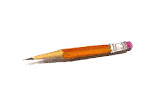Thursday, May 13, 2010
No Need to "Pardon My French"
The expression "Pardon my French," which I have never liked, should be replaced with "Admire my French!" Someone uses some sort of profanity, and in a show of false embarrassment or pretended regret at having used such language, asks to be forgiven. Why would anyone want to apologize for using one of the world's most eloquent languages, and I might add, a very difficult one to master. Is it because French language speakers are considered more libertine, more risqué in their use of language, and that consequently, if one swears, one was only being a bit French, since the equivalent word or expression, were it to be used among French speakers, would not raise an eyebrow? Perhaps French speakers are more permissive, more tolerant, more naughty? I wonder if we are all just a bit envious.
I was lately reminded of the expression by an excellent article that appeared in the New York Times written by Michael Kimmelman's and entitled "Pardon My French," only here, the expression wittily suits the author's purposes. Kimmelman is razor sharp in his theory of how the French language will carry on in the future, even prosper, thanks to populations of peoples outside the Hexagon, explaining that France's proprietory relationship to the French language cannot continue, and that the French must get a grip on reality, ie, he writes, "French is now spoken mostly by people who aren't French. More than 50 percent of them are African. French speakers are more likely to be Haitians and Canadians, Algerians and Senegalese, immigrants from Africa and Southeast Asia and the Caribbean who have settled in France, bringing their native cultures with them."
Kimmelman goes a step further in raising the question, "So what does French culture signify these days when there are some 200 million French speakers in the world, but only 65 million are actually French?" He relates the story of Andrei Makine, a Russian-born novelist who has not only written novels in French for the past three decades, has been awarded France's highest literary honors for his works. Writing in French has allowed Makine to belong to a culture which is not that of his mother tongue. And Kimmelman reminds us that although France lays claim to non-French born French-language writers such as Beckett (Irish), Ionesco (Roumanian), and Kundera (Czech), it virtually ignores what comes out of the Carribbean or North Africa.
Albert Camus once said, Ma patrie, c'est la langue française. "The French language is my homeland." After more than four decades of an ongoing love affair with the French language, now there's an expression I can live with.
Subscribe to:
Posts (Atom)




















